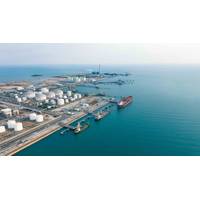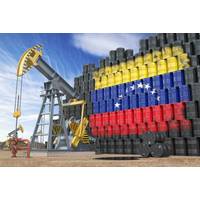Russian Oil Exports Remain Stable Despite Recent Sanctions

Russia has maintained a steady pace of oil shipments from its sea ports at the start of November despite fresh U.S. sanctions imposed on the country's largest oil companies, traders said and LSEG data shows.The United States last week introduced sanctions against Russia's two biggest oil producers, Lukoil and Rosneft. These are the first direct sanctions on Russia imposed by U.S.
Bulgaria Temporarily Bans Fuel Exports to EU Following Lukoil Sanctions

Bulgaria's parliament temporarily banned on Friday exports of some fuels, mainly diesel and aviation fuel, to EU member states to ensure the stability of the local market following U.S. sanctions on Russia's Lukoil, which runs the country's biggest oil refinery.Last week, Bulgaria announced it would take measures to secure uninterrupted supplies of oil and oil derivatives after the U.S.
Russia Revises Oil Exports from Ust-Luga, Novorossiisk Ports

Russia has increased its planned oil loadings from the Baltic port of Ust-Luga and the Black Sea port of Novorossiisk for September, following disruptions at its main western outlet, Primorsk, two sources familiar with the schedule told Reuters.The diversion of oil flows to less affected western ports may help Russia keep overall exports relatively stable despite infrastructure damage. Moscow is making an effort to maintain high oil sales, which remain the backbone of its budget revenue.The increase in seaborne exports also comes amid unplanned shutdowns at several Russian refineries…
Nigerian President Lifts Emergency Rule, Resuming Crude Exports

Nigerian President Bola Tinubu on Wednesday lifted a six-month emergency rule in Rivers State, reinstating Governor Siminalayi Fubara and other officials, after saying that a constitutional crisis that had paralysed governance had been resolved.The emergency rule, imposed on March 18, followed a standoff between Fubara and the state legislature that disrupted budget approvals and left the government in limbo. Tinubu said the measure was necessary to prevent anarchy.Rivers State, located in the oil-producing Niger Delta, is an important hub for Nigeria's crude exports.
Kazakhstan Resumes Baku-Tbilisi-Ceyhan Pipeline Exports After Contamination Issues

Kazakhstan resumed oil supplies via the Baku-Tbilisi-Ceyhan pipeline on September 13, state energy company Kazmunaygaz said on Wednesday.Supplies via the route were suspended last month amid contamination issues.The BTC pipeline, which runs through Georgia to Turkey, is used mainly to export oil from the Azeri, Chirag and Guneshli oilfields, which are operated by BP.The pipeline is also used by Kazakhstan as a way to lessen its dependence on Russia as a main exporting route. More than 80% of…
Poland Urges EU Members to End Russian Oil Imports by 2026

Poland has urged European Union member states that are still buying Russian energy to end those imports by the end of 2026 and will offer them help towards that effort, Energy Minister Milosz Motyka said on Wednesday.The Druzhba oil pipeline delivers Russian oil to Hungary and Slovakia, which continue to buy energy supplies from Russia after other EU nations cut ties following Russia's full-scale invasion of Ukraine in 2022.The European Commission will propose speeding up the phasing out of Russian fossil imports, the EU executive head Ursula von der Leyen said on Tuesday after a call with U.S.
Russia to Increase Oil Exports After Drone Strikes Shut Refineries

Russia plans to increase exports from its western ports to nearly two million barrels per day in August, about 200,000 bpd more than a previous estimate, after two refineries cut runs following Ukrainian drone attacks, two industry sources said.The extra oil has the potential to add to downward pressure to the global oil market as supplies are already set to be increased by an output hike agreed on Sunday by OPEC+, the Organization of the Petroleum Exporting Countries and allies, including Russia.The Ryazan and Novokuibyshevsk refineries…
Venezuelan Oil Exports Declined in July as Partners Awaited US Authorizations

Venezuela's oil exports declined about 10% in July from the previous month as key partners of state company PDVSA awaited U.S. authorizations to expand operations in the country, according to vessel tracking data and company documents.Washington in late July green lit producer Chevron to operate in the sanctioned country and export its crude to the U.S. under a restricted license that does not allow any payment to Venezuelan President Nicolas Maduro's administration.Other PDVSA partners are still…
China Ramps Up Refined Fuel Exports As Profit Margins Rise

China's exports of key refined fuels are on track to jump to the highest in 16 months as refiners take advantage of rising profit margins.Shipments in July of middle and light distillates, which include diesel and gasoline, are forecast to reach 26.63 million barrels, or 859,000 barrels per day, data compiled by commodity analysts Kpler shows.This figure is up from 796,000 bpd in June and the highest since the 1.06 million bpd in March 2024, the data shows.China's refiners have substantial spare…
Daily Oil Exports From Russia's Western Ports Will Drop 8% in August

Russia's daily oil exports from its western ports are set to be around 1.77 million barrels per day (bpd) in August, down from 1.93 million bpd in July's plan, amid the expected rise in refinery runs, Reuters calculations based on data from two sources show.On a daily basis oil loadings from Russia's Primorsk, Novorossiisk and Ust-Luga including Urals, Kazakh KEBCO and Siberian Light oil grades will decline some 8% in August from the current month.Russia's offline primary oil refining capacity…
Russian FSB Allow Foreign Tankers to Access Black Sea Ports; Kazakh Oil Exports Resume

Russia's FSB security service has started handing out clearance for foreign tankers to access the Black Sea ports, allowing for Kazakhstan's oil exports to resume after they were halted for nearly a day, four industry sources said on Thursday.The suspension led to the disruption of around 2% of global supply and drove international oil prices to almost $70 a barrel on Thursday before they pared gains. Russian regulations mean foreign ships require the approval of Russia's FSB security service…